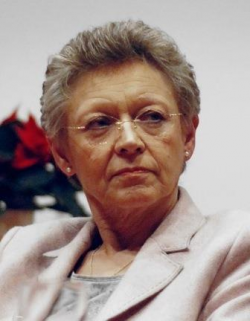Dr Françoise Barré-Sinoussi

- Born
- 30 July 1947
Françoise Barré-Sinoussi is a French virologist who, alongside Luc Montagnier, identified the human immunodeficiency virus (HIV) in 1983, for which they both won the Nobel Prize.
Barré-Sinoussi was born in France in 1947. She grew up in Paris, where she remained to live and still works. Her passion for science first arose in her as a small child when she would go on family holidays to the countryside and observe the 'wonders of the natural living world'.
Having gone to study Natural Sciences at the University of Paris in 1966, Barré-Sinoussi was keen to take on some lab work to see if a career in research was for her. Against the odds, she convinced the Pasteur Institute in Paris to let her intern there. The not-for-profit organisation had a focus on infectious diseases and their laboratory was previously open only to fully-trained researchers. She went on to gain her PhD there in 1974 on delaying the progression of leukaemia.
In 1981 a rare illness started to be reported in Los Angeles, Unites States. Five men had been infected and two of them had died from it. Reports of the illness described symptoms of severe fatigue, fever, weight loss and seemingly only affecting gay men. A year later, the disease got its name – Acquired Immunodeficiency Syndrome (AIDS).
As reports of the illness continued to spread throughout the US and worldwide, Barré-Sinoussi was still working at the Pasteur Institute. By this time she was studying retroviruses – viruses that can alter the genetic code of the cells they infect. She was approached by Dr Luc Montagnier who wanted to investigate if a retrovirus was responsible for AIDS.
Barré-Sinoussi noticed swollen lymph nodes in affected patients from which she took biopsies (samples of tissue). In 1983 she analysed the biopsied lymph nodes in a lab and found that there was indeed a retrovirus that was spreading through the infected node cells. The virus was named lymphadenopathy associated virus (LAV) – later renamed the human immunodeficiency virus (HIV) to better reflect its nature. She was awarded the 2008 Nobel prize in Physiology or Medicine along with her mentor Dr Luc Montagnier.
Since 1983, there have been many new advances in science because of Barré-Sinoussi's discovery of HIV. A diagnostic test was developed soon after the discovery of the virus, meaning that blood transmission could be prevented and infected individuals identified for treatment. There's now also understanding of how to prevent mother-to-child transmission and antiretroviral therapies have been developed to supress and stop the progression of HIV.
Since her discovery, Barré-Sinoussi has continued to work at the Pasteur Institute. Now her and her colleagues are researching the correlation of the immune system with protection against HIV to develop a potential vaccine against the disease. They are also studying natural protection against the disease and how the immune system controls and reacts to HIV infection.



